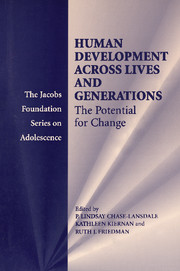Book contents
- Frontmatter
- Contents
- Figures and Tables page
- Contributors
- Foreword
- Acknowledgments
- HUMAN DEVELOPMENT ACROSS LIVES AND GENERATIONS
- Part I Introduction and Overview
- Part II Human Capital
- 3 An Overview of Economic and Social Opportunities and Disadvantage in European Households
- 4 Parental, Childhood, and Early Adult Legacies in the Emergence of Adult Social Exdusion: Evidence on What Matters from a British Cohort
- 5 Individual and Parent-Based Intervention Strategies for Promoting Human Capital and Positive Behavior
- Part III Partnership Behavior
- Part IV Psychological Health and Development
- Part V Conclusion
- Index
3 - An Overview of Economic and Social Opportunities and Disadvantage in European Households
from Part II - Human Capital
Published online by Cambridge University Press: 12 October 2018
- Frontmatter
- Contents
- Figures and Tables page
- Contributors
- Foreword
- Acknowledgments
- HUMAN DEVELOPMENT ACROSS LIVES AND GENERATIONS
- Part I Introduction and Overview
- Part II Human Capital
- 3 An Overview of Economic and Social Opportunities and Disadvantage in European Households
- 4 Parental, Childhood, and Early Adult Legacies in the Emergence of Adult Social Exdusion: Evidence on What Matters from a British Cohort
- 5 Individual and Parent-Based Intervention Strategies for Promoting Human Capital and Positive Behavior
- Part III Partnership Behavior
- Part IV Psychological Health and Development
- Part V Conclusion
- Index
Summary
The socioeconomic position one Starts from in life is a key determinant of life chances, as consistently shown by a vast research literature across different disciplines and relating to various industrialized societies. However, that socioeconomic starting point is a far from perfect predictor of outcomes - some people do better, and some worse, from what look to be similar starting points. Furthermore, the price paid by those who do poorly can itself be very different in different societies. So there is much to be learned from the way different societies seek to promote healthy development and minimize the price of failure. The aim of this chapter is to provide an overview of socioeconomic disadvantage versus opportunity in Europe. It is focused in particular on human capital and its relationship to opportunities and disadvantage for individuals and households over the life course. It both draws on recent research and investigates an exciting new source of comparative data, the European Community Household Panel survey (ECHP). This allows an in-depth examination of the countries currently in the European Union (EU), which we put in perspective where possible by drawing on information about a number of countries soon to join the Union, and about Canada and the United States.
We begin with an overview of disadvantage and opportunities, two sides of the same coin, in Section 3.1. We describe the extent of poverty in the EU, and more broadly in the rieh countries of the world, and conversely the living Standards and opportunities enjoyed by those who are doing well. There is much to be learned from examination of a snapshot picture, particularly given this comparative perspective, but it is also essential to incorporate the dynamic processes at work over time. We therefore exploit the fact that persistence versus change in income poverty from year to year - albeit over a relatively short period - can also be explored using panel data from the first three waves of the ECHP. Measuring both persistence of low income and direct experience of deprivation allows us to capture the extent and nature of poverty and exclusion much more fully than a measure of current income alone.
We then turn to human capital, where we have to rely on educational attainment as an incomplete but widely available indicator.
- Type
- Chapter
- Information
- Human Development across Lives and GenerationsThe Potential for Change, pp. 31 - 62Publisher: Cambridge University PressPrint publication year: 2004



